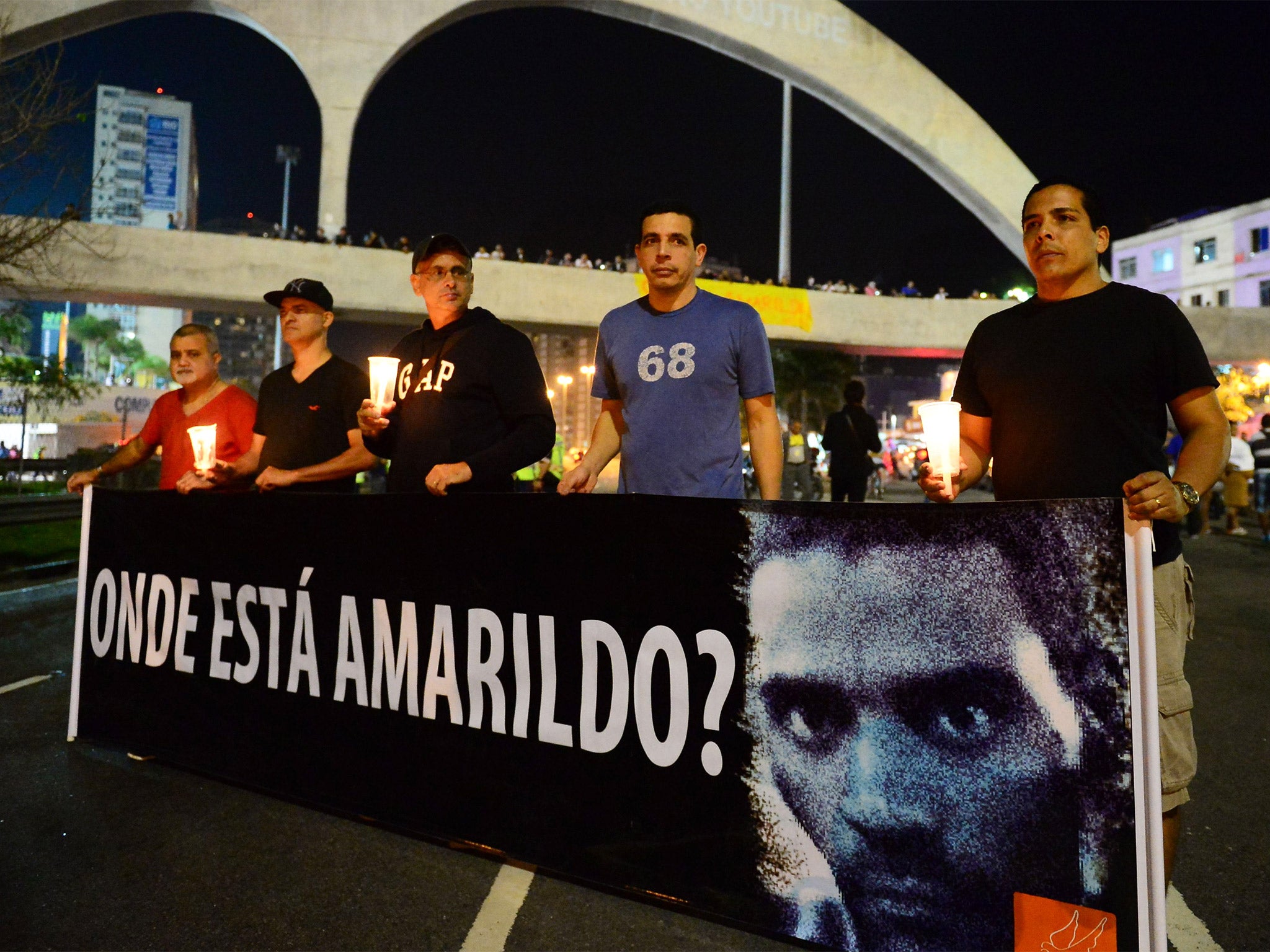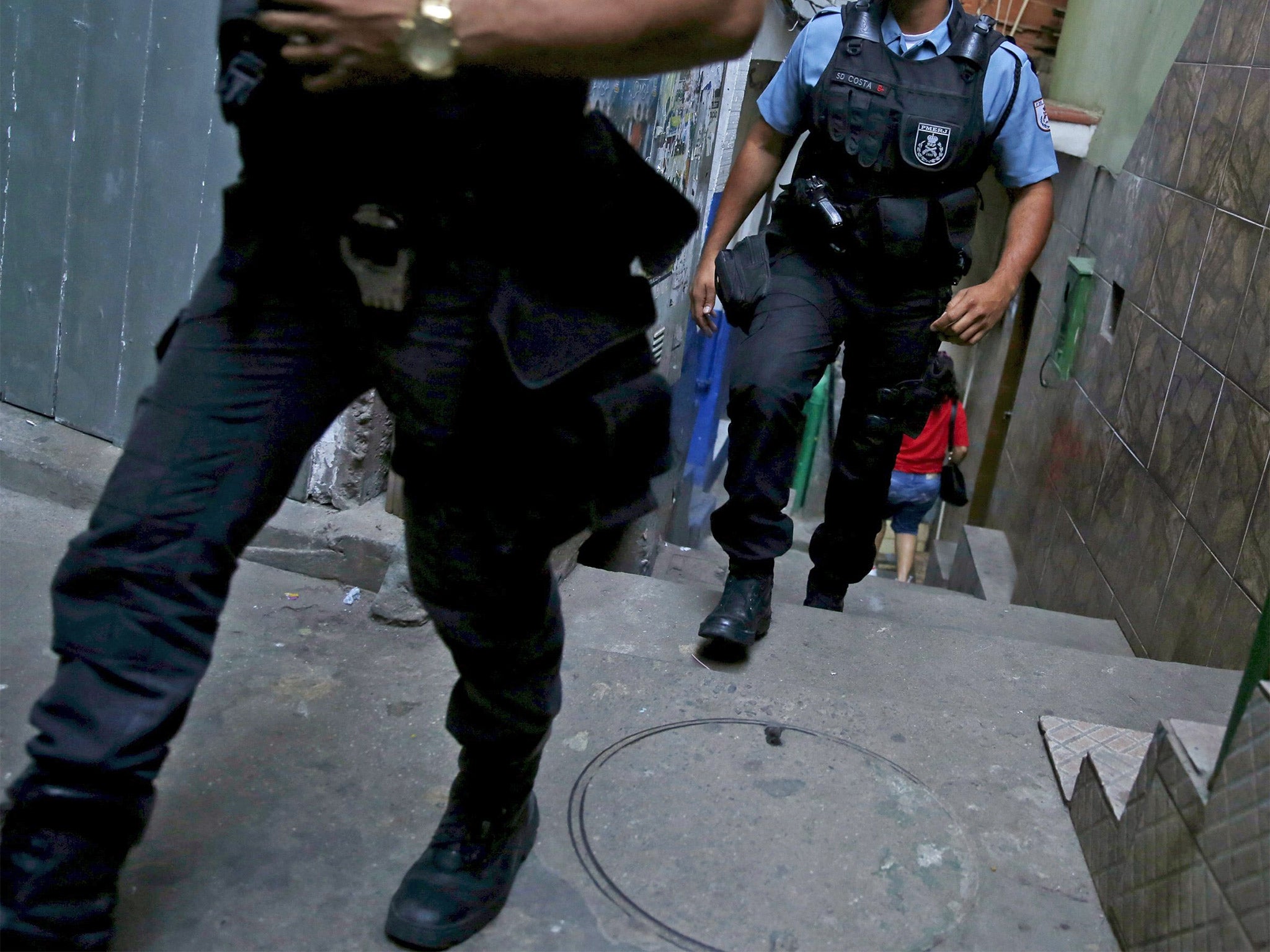Will the death of a bricklayer and father of six finally make Brazil face up to its policing problems?
Prosecutors are examining new evidence that suggests Rio's notorious Bope unit was involved in the removal of Amarildo de Souza's body from Rocinha favela

Your support helps us to tell the story
From reproductive rights to climate change to Big Tech, The Independent is on the ground when the story is developing. Whether it's investigating the financials of Elon Musk's pro-Trump PAC or producing our latest documentary, 'The A Word', which shines a light on the American women fighting for reproductive rights, we know how important it is to parse out the facts from the messaging.
At such a critical moment in US history, we need reporters on the ground. Your donation allows us to keep sending journalists to speak to both sides of the story.
The Independent is trusted by Americans across the entire political spectrum. And unlike many other quality news outlets, we choose not to lock Americans out of our reporting and analysis with paywalls. We believe quality journalism should be available to everyone, paid for by those who can afford it.
Your support makes all the difference.When Amarildo de Souza went missing from Rio de Janeiro’s biggest favela after being questioned by police, the case rocked the city’s efforts to bring peace to its most troubled communities.
Allegations that the bricklayer and father of six was tortured for 40 minutes by officers before disappearing undermined the pacification of Rocinha favela, long since a breeding ground for drug gangs, violence and crime.
Two years later, fresh revelations have implicated the city’s elite special operations squad, reopening wounds that injured fragile trust in the peace programme.
Prosecutors are examining new evidence that suggests the city’s notorious Bope unit was involved in the removal of Amarildo’s body from Rocinha. His remains have yet to be found. Fourteen Bope officers have now been suspended while the investigation is carried out.

According to officials, analysis of CCTV footage shows a bundle “not incompatible with that of a corpse” packed into a Bope truck on the night Amarildo went missing.
Amarildo was taken for questioning by police on the weekend of an anti-drugs raid in July 2013 and allegedly asphyxiated, stunned with a Taser gun and drowned in a bucket of water.
The case made headlines in Brazil and abroad, inspiring a high-profile social media campaign asking: “Where is Amarildo?”
Brazil’s police are responsible for around 2,000 deaths a year in Brazil, according to Amnesty International, and in the state of Rio de Janeiro more than 5,000 people have been killed for resisting arrest in the past five years.
The disappearance of Amarildo shone a spotlight on the excessive force used by Brazilian police and a level of police corruption and abuse of power within the pacification programme, which had aimed to improve security ahead of the 2014 World Cup and next year’s Olympic Games.

A total of 25 officers were charged; all were accused of torture, 17 of concealing a body, 13 for conspiracy and four for procedural fraud. Their cases are still going through the courts. Bope, a division of Rio’s military police, was called to Rocinha that night “to be seen”, according to Major Edson Santos, the then commander of the pacifying police unit (UPP) in Rocinha, who was one of the officers arrested.
“The aim is to check for the participation of other officers in the concealment of the body. We are working with suppositions that deserve to be investigated,” said prosecutor Carmen Eliza Bastos de Carvalho.
The heavily armed Bope is a tactical reserve normally deployed in “critical situations”, and is known by its controversial logo of a dagger through a skull over crossed guns. Bope officers are often the first to enter during operations to pacify a favela ahead of the installation of a UPP.
The programme has been running since 2008 but while residents welcomed the UPP when they first arrived, in the hope they would create stability, they have been treated with mistrust and fear since Amarildo’s disappearance. The ripple effect of his death created pockets of resistance in the biggest favelas, which have undermined the authority of the police.
Last year, security authorities resorted to calling in the army to Complexo da Maré favela to pave the way for pacification police, but denied the programme was in crisis. The latest development in the Amarildo case has reinforced calls for the demilitarisation of the police. “I would say the participation of Bope shows very clearly that the Amarildo case was not only misconduct on the part of the then commander of the Rocinha UPP and some of his subordinates,” said Gerardo Santiago, a lawyer and activist.
“It is emblematic of the prevailing culture in the military police and of a police practice in Brazil that dates back to colonial times, that of the ‘bush captains’ who were hunters of slaves between the 17th and 19th century.”
Police practices were called into question again when a 10-year-old boy was shot dead on his doorstep in Complexo do Alemão favela in April.
Meanwhile, between 2007 and 2013, there were more than 35,000 disappearances in Rio, which led to the creation of a special missing persons police department after a concerted campaign last year.
For Amarildo’s family, the latest development at least gives hope that his remains may finally be found.
“I hope the courts ask ‘where are the remains of Amarildo?’ so his family can bury him with dignity,” said Elizabeth Gomes da Silva, Amarildo’s widow.
Subscribe to Independent Premium to bookmark this article
Want to bookmark your favourite articles and stories to read or reference later? Start your Independent Premium subscription today.
Join our commenting forum
Join thought-provoking conversations, follow other Independent readers and see their replies
Comments